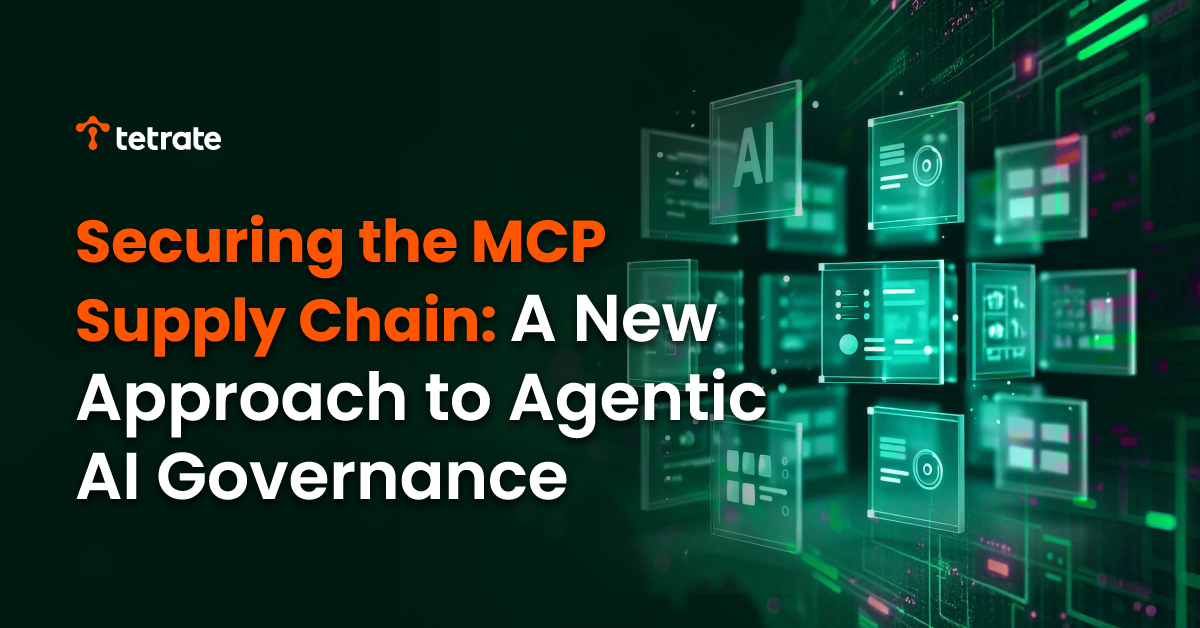Securing the MCP Supply Chain: A New Approach to Agentic AI Governance
Learn how to govern agentic AI systems that depend on third-party MCP services with curated repositories, capability-based access control, and comprehensive security monitoring at the infrastructure layer.

As agentic AI systems take on more autonomous decision-making in enterprise environments, they’re becoming increasingly reliant on external services through protocols like the Model Context Protocol (MCP). For organizations in regulated industries, this raises a critical question: how do you govern AI agents that depend on third-party services you don’t directly control?
The MCP Supply Chain Challenge
The Model Context Protocol has rapidly emerged as the standard way to extend AI agents with specialized capabilities from real-time market data and regulatory compliance checks to customer verification and risk assessment tools. This extensibility is powerful, but it introduces supply chain dependencies that many organizations haven’t yet fully addressed.
Unlike traditional API integrations, where data flows are relatively static and predictable, MCP servers can dynamically influence agent reasoning and decision-making in real time.
-
A compromised market data server doesn’t just provide bad data—it can corrupt every trading decision an agent makes.
-
A manipulated compliance verification service doesn’t just miss one violation—it can enable systematic regulatory breaches across your operation.
The FINOS AI Governance Framework recently added guidance on this exact risk, identifying MCP server supply chain compromise as a critical attack vector for agentic systems. The concern isn’t hypothetical. We’ve seen supply chain attacks in other domains—from SolarWinds to the recent npm package compromises—and the distributed nature of MCP architectures creates similar vulnerabilities at scale.
Why Traditional Controls Fall Short
Many organizations approach MCP security with the same controls they apply to traditional third-party APIs: vendor questionnaires, compliance certifications, and periodic security reviews. While these remain important, they’re insufficient for the unique characteristics of agentic AI systems.
-
Dynamic influence on reasoning
Traditional vendor management assumes stable, well-defined data flows. MCP servers, however, participate directly in agent reasoning. The data they provide shapes how agents think about problems and what solutions they consider. -
Monitoring blind spots
Conventional monitoring focuses on availability and error rates. But an MCP server can be fully operational while quietly providing biased or corrupted data that influences thousands of agent decisions before detection. -
Access control complexity
Traditional access control assumes clear, enforceable boundaries. But agents often need to dynamically compose capabilities from multiple MCP servers. Managing this combinatorial complexity through legacy controls quickly becomes unworkable.
A Governance-First Approach
Securing the MCP supply chain requires three foundational capabilities:
Curated MCP Server Repositories: Rather than allowing agents to connect to arbitrary MCP servers, organizations need centrally managed catalogs of vetted services. This goes beyond an “approved vendor list”—it requires ongoing security monitoring, behavioral analysis, and rapid response when issues emerge.
Capability-Based Access Control: Not every agent needs access to every MCP server. A customer-service agent doesn’t need trading data. An investment advisory agent doesn’t need identity verification. Fine-grained control should map agent roles to the services they require. Access should reflect operational role, not blanket entitlements.
Communication Security and Monitoring: Every interaction between agents and MCP servers should be authenticated, encrypted, and logged. But beyond basic security hygiene, organizations need the ability to detect anomalies—unusual data patterns, unexpected communication behaviors, or response characteristics that might indicate compromise or malfunction.
Introducing Tetrate Agent Router Service with MCP Integration
We built Tetrate Agent Router Service to address these governance challenges at the infrastructure layer. By integrating MCP with our Envoy-based AI Gateway, we provide organizations with comprehensive control over their agentic AI supply chain.
The architecture centers on three key capabilities:
Trusted MCP Catalog: Organizations can browse and select from a curated repository of vetted MCP servers, with built-in security assessments and continuous monitoring. This shifts the burden of ongoing vendor security evaluation from individual teams to centralized infrastructure with appropriate expertise and tooling.
Profile-Based Tool Assignment: Administrators create profiles—logical groupings of MCP servers—and map them to API keys. This enables precise control over which agents can access which external services. Each profile gets its own API key, ensuring agents only access the capabilities they need for their specific role.
Centralized Security and Observability: Because all MCP traffic flows through the gateway, organizations gain unified visibility and control. Security teams can monitor for anomalies, log comprehensively for compliance, enforce circuit breakers on suspicious servers, and apply data validation rules—all without changing individual agents.
Looking Forward
As agentic AI systems take on more autonomous responsibilities in regulated environments, the security and governance of external dependencies becomes increasingly critical. Organizations can’t simply trust that third-party MCP servers will maintain appropriate security standards—they need infrastructure-level controls that provide visibility, enforcement, and rapid response capabilities.
The integration of MCP security controls at the gateway layer represents a maturation of agentic AI architecture. By treating MCP supply chain security as an infrastructure concern rather than an application concern, organizations can establish consistent governance across all their agentic systems while maintaining the flexibility and extensibility that makes MCP valuable in the first place.
For technical executives in regulated industries, the question isn’t whether to adopt agentic AI—competitive pressures are already making that decision. The real question is: do you have the infrastructure to govern these systems as they scale.
MCP supply chain security must be central to that planning.
Learn more about Tetrate Agent Router Service to see how it can help you secure your agentic AI supply chain.
Contact us to learn how Tetrate can help your journey. Follow us on LinkedIn for latest updates and best practices.










